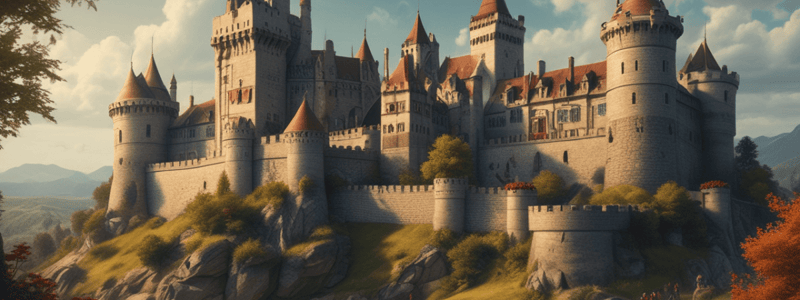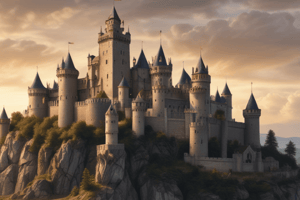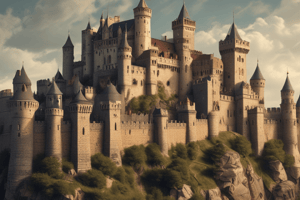Podcast
Questions and Answers
What was the main form of government and social structure during the Middle Ages?
What was the main form of government and social structure during the Middle Ages?
- Democracy
- Dictatorship
- Monarchy
- Feudalism (correct)
What type of castles were almost invincible, with a low outer wall surrounding a taller inner wall?
What type of castles were almost invincible, with a low outer wall surrounding a taller inner wall?
- Concentric castles (correct)
- Gothic castles
- Motte and bailey castles
- Shell keeps
What was the function of the manor house in the medieval manor system?
What was the function of the manor house in the medieval manor system?
- Communal center and lord's residence (correct)
- Storage facility
- Peasant housing
- Prison for enemies
During the Middle Ages, how many days a week did peasants typically work on the demesne?
During the Middle Ages, how many days a week did peasants typically work on the demesne?
Which type of castles were defined by being taller with grand arching ceilings and detailed stone work?
Which type of castles were defined by being taller with grand arching ceilings and detailed stone work?
What transformation happened to the first simple castles (motte and bailey) as they evolved?
What transformation happened to the first simple castles (motte and bailey) as they evolved?
What distinguished Gothic castles from other types of castles?
What distinguished Gothic castles from other types of castles?
What type of castles brought comfort into castle living with their architectural design?
What type of castles brought comfort into castle living with their architectural design?
What made concentric castles almost invincible?
What made concentric castles almost invincible?
What was the primary way in which peasants paid for living on the manor?
What was the primary way in which peasants paid for living on the manor?
What was a typical part of a peasant diet in medieval times?
What was a typical part of a peasant diet in medieval times?
What were peasant houses typically constructed of?
What were peasant houses typically constructed of?
Who was responsible for protecting the peasants living on a manor?
Who was responsible for protecting the peasants living on a manor?
What was a central feature of the manor in medieval Europe?
What was a central feature of the manor in medieval Europe?
When did the Crusades take place?
When did the Crusades take place?
What was the purpose of the Crusades?
What was the purpose of the Crusades?
Which English monarch succeeded his cousin Stephen in 1154?
Which English monarch succeeded his cousin Stephen in 1154?
What was King Henry II's first step after gaining power?
What was King Henry II's first step after gaining power?
'The Magna Carta' placed restrictions on which English monarch's power?
'The Magna Carta' placed restrictions on which English monarch's power?
What did a typical peasant diet consist of in medieval times?
What did a typical peasant diet consist of in medieval times?
What building materials were commonly used in constructing peasant houses in medieval Europe?
What building materials were commonly used in constructing peasant houses in medieval Europe?
What was the purpose of jousts in medieval Europe?
What was the purpose of jousts in medieval Europe?
What was the main goal of the Crusades fought between Christian Europeans and Islamic Arabs?
What was the main goal of the Crusades fought between Christian Europeans and Islamic Arabs?
What did the Constitutions of Clarendon in medieval England primarily aim to do?
What did the Constitutions of Clarendon in medieval England primarily aim to do?
What significant document signed in 1215 placed restrictions on English monarchs' power?
What significant document signed in 1215 placed restrictions on English monarchs' power?
Who became the English monarch after succeeding his cousin Stephen in 1154?
Who became the English monarch after succeeding his cousin Stephen in 1154?
'The lord of the manor was a member of the nobility who made a promise of military service to the king in return for being granted the manorial estate.' Based on this information, what was a main responsibility of the lord of the manor?
'The lord of the manor was a member of the nobility who made a promise of military service to the king in return for being granted the manorial estate.' Based on this information, what was a main responsibility of the lord of the manor?
'A central feature of the manor was the church.' Why was the church considered an important component of a manor estate during medieval times?
'A central feature of the manor was the church.' Why was the church considered an important component of a manor estate during medieval times?
What was the primary purpose of a medieval castle?
What was the primary purpose of a medieval castle?
Which type of castles was initially constructed with a low stone outer wall surrounding a taller inner wall?
Which type of castles was initially constructed with a low stone outer wall surrounding a taller inner wall?
What was the main form of government and social structure during the Middle Ages?
What was the main form of government and social structure during the Middle Ages?
What was the function of the manorial system in medieval Europe?
What was the function of the manorial system in medieval Europe?
What type of castles brought luxury into castle living through their architectural features?
What type of castles brought luxury into castle living through their architectural features?
What distinguished Gothic castles from other castle types during the Middle Ages?
What distinguished Gothic castles from other castle types during the Middle Ages?
What characterized the manorial system in medieval Europe?
What characterized the manorial system in medieval Europe?
Flashcards are hidden until you start studying
Study Notes
Medieval Castles
- Medieval castles were strong, protected areas that kept the enemy out and the people inside safe.
- Castles underwent many changes during the Middle Ages, which was a period of European history from the 5th to the 15th centuries.
- The first simple castles (motte and bailey) were eventually transformed with shell keeps.
- Castles were then built of stone for more protection.
- Gothic castles were characterized by their tallness, grand arching ceilings, and detailed stone work, bringing comfort into castle living.
- Concentric castles were made with a low stone outer wall that surrounded a taller inner wall, making them almost invincible.
The Manorial System
- The manorial system was the central feature of feudalism, the main form of government and social structure during the Middle Ages.
- The medieval manor was a large estate granted to a lord by the king.
- The manor house served as the communal center of the manor and the residence of the lord and his family.
- Peasants lived on the manor in exchange for working the land reserved for the lord, known as the demesne.
- Peasants worked six days a week, spending three days tending to the demesne and three days working their own small piece of land.
- Peasant houses were constructed of wattle and daub, a mixture of wood, mud, manure, and straw.
- The lord of the manor was a member of the nobility who made a promise of military service to the king in return for being granted the manorial estate.
- The lord was responsible for protecting the peasants that lived on his manor.
- The size of a manor reflected the lord's wealth and status, with defensive fortifications such as protective walls and moats.
- The manor house typically consisted of various structures or rooms, including the great hall, a kitchen, a buttery, a food storage area, and the solar.
- A central feature of the manor was the church.
- Other components of a manor estate might include a river or stream, barns, a mill, and an area of woodland for hunting game.
Knights
- Knights were soldiers who were often born into nobility, which included kings, queens, wealthy landowners, and powerful lords and ladies of estates.
- Knights participated in a training process and engaged in jousts, a contest where two knights faced off against each other on horseback, to prepare for battle.
- The Code of Chivalry was a strict set of rules that knights had to follow.
The Crusades
- The Crusades were a series of holy wars fought between Christian Europeans and Islamic Arabs between 900 and 750 years ago.
- The Pope, the religious leader of Christianity in Europe, called for Christians to retake the Holy Land in the Middle East.
- The Crusades were thought to be a pilgrimage and a holy duty, but only the first Crusade was successful.
- Although the later Crusades failed, they brought back new ideas, inventions, and interest in exploration to Europe.
King Henry II
- King Henry II became the English monarch, succeeding his cousin Stephen, in 1154.
- He married Eleanor of Aquitaine to get access to her French lands, which angered her first husband, the King of France.
- Henry's first step after gaining power was to become the ruler of Anjou and Normandy.
- His accomplishments included improving the English judicial system.
- King Henry II wrongly hoped that Thomas Becket, his chancellor or senior official, would help him get control over the Catholic Church's legal system too.
- Their long-running feud eventually led to Thomas Becket's death.
The Constitutions of Clarendon
- The king wanted to preserve his power, so he created the Constitutions of Clarendon, which said that the Church would be limited in excommunication, that the king got to choose religious leaders, and that the government should punish lawbreakers, not the church.
- When the king created the constitutions, he angered Thomas Becket, the archbishop of Canterbury.
- This disagreement eventually led to Thomas' death in the year 1170.
The Magna Carta
- The Magna Carta established rights and freedoms in England that the king couldn't take away.
- It has influenced many important ideas about government throughout history, including the United States Constitution.
- It provided protection for the English by putting restrictions, or limits, on the king's power.
- It was signed by King John in 1215 after the English barons succeeded in negotiating for their rights.
Studying That Suits You
Use AI to generate personalized quizzes and flashcards to suit your learning preferences.




